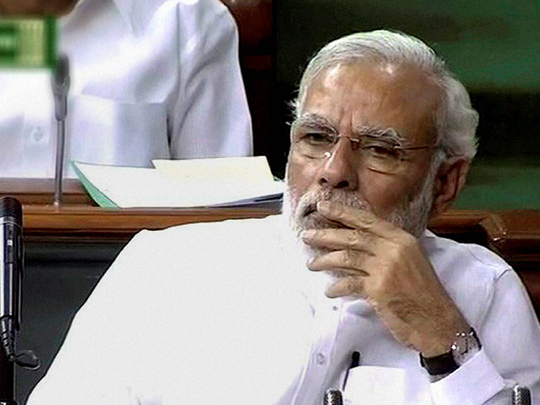
His silence was deafening and when he spoke it was too little, too late by a prime minister on a mission to transform India. Words such as “unfortunate and unwarranted” over the lynching of a man in Dadri due to rumours that he had stored and consumed beef are the least Narendra Modi could have said to stem the ideological fringe from defining perceptions of India.
Modi echoed what a clutch of central ministers had been telling the media over the last few days in a way that contradicted the statesman’s image he has been busy cultivating worldwide and much unlike the man who won India on the promise of tomorrow.
I refer to the Dadri incident as an alarming tipping point in India’s political cauldron, where the ruling party is surreptitiously fanning Hindu supremacy through mob militancy and is not prepared to unequivocally apologise for it or disown the elements responsible for it.
Bharatiya Janata Party (BJP) leaders have criticised the killing but have justified that eating beef in India is now a sin in more than a dozen ways. For them, the murder was unwarranted as it diverted the public discourse that they want to pursue in order to protect the ‘sacred’ cow.
It is clear that the right-wing has charted a course of unipolarity of cultural India through the collective fantasy of its gatekeepers who want to throw out blasphemers and subversives, who to them are cultural polluters challenging the fundamentals of their deemed religious heritage. For them, coming to power is all about creating that proverbial ‘Ram Rajya’ which can be digitised but is ruled on mythological moorings.
These are clear well-thought-out actions where they also have a drafted response to the orchestrated incidents — whether it is the beating of dating couples in Mangalore, the murder of rationalists in Maharashtra and Karnataka or communally provocative statements that range from “in spite of being a Muslim” and “go to Pakistan”.
However, it is a far cry from the India that is being marketed by the prime minister, who promised not to scrounge from the glossary of the mythology, Ramayana. Modi, being a brilliant communicator, must politically, socially and administratively deny the right-wing Hindu hardliners from rebranding India because sooner rather than later the delirium of the ideological tassel will start to define the country he is pushing to digitise.
He must do everything to make them insignificant or run the risk of losing his own argument in the din well before 2019. It is he who cannot run the risk of grounding his India story by presenting to the world a country marinated in religious chauvinism. And that is exactly why he should have apologised. It is he who made an argument for winning India on the promise of ‘achhe din’ (good days are coming). It is he who is touring the world with a shrill sales pitch of presenting an India of and for tomorrow. It is Modi who chose to converse with the present in a language of the young and the aspirational.
An argument is being presented that Modi is the Prime Minister of India and not a daroga (officer-in-charge of a police station) of Dadri. The secularists in their zeal to present Modi as a religious zealot have let the Uttar Pradesh state government — which is primarily responsible for the killing — off the hook. Modi appeared to give this credence when he said: “But what is the role of the central government in these incidents?”
Religio-centric politics
This is exactly why I call this incident a tipping point in Indian politics, as the killing goes beyond the nuances of the administrative responsibilities of central and state governments. A critical analysis of the incident will send a shiver down the spine of anyone familiar with the spreadsheet of religio-centric politics in India. A temple loudspeaker was used to rouse a mob probably for the first time since the riots of 1947, which not only is against Hindu tradition to summon the faithful but signs of a well-calculated cauterisation of the unfaithful.
It is true that the claimants’ secularism completely ignored the culpability of the Samajwadi Party in power in Uttar Pradesh and has turned the incident into a weapon to attack Modi’s secular credentials. The opposition in all its banality has left the ‘holiness’ of the cow repeatedly unchallenged both at the centre and state level, which indirectly is giving credence to the right wing as they have started to believe that there isn’t any real opposition to saving the ‘holy’ cow. The plaintiffs of secular votes in India Lalu — Nitish, Mamata, Akhilesh and the entire Congress party — paid lip-service but did not bother to take on the right-wing for fear of losing the Hindu vote.
Modi is not good at apologising, but this time as prime minister he should have remembered the advice of his predecessor Atal Bihari Vajpayee, following Raj Dharma (the duty of rulers) in 2002. By saying sorry he would have won more hearts than by portraying the event as “sad and undesirable”. It is time to show the cultural right its rightful place or Modi’s ambition for a piece of India’s history embossed with his name will remain a distant dream.
Archisman Dinda is a freelance journalist based in Kolkata, India.









